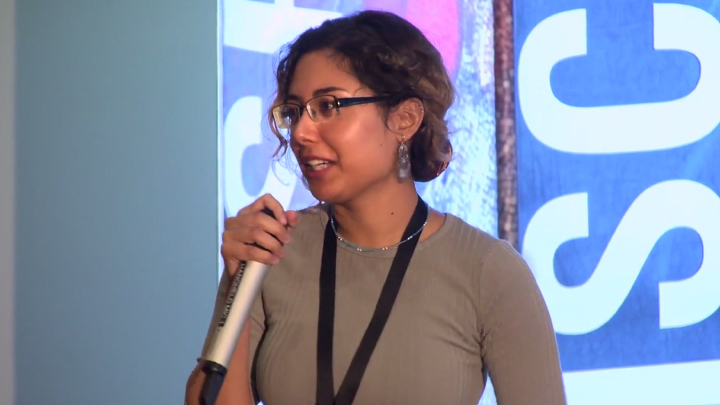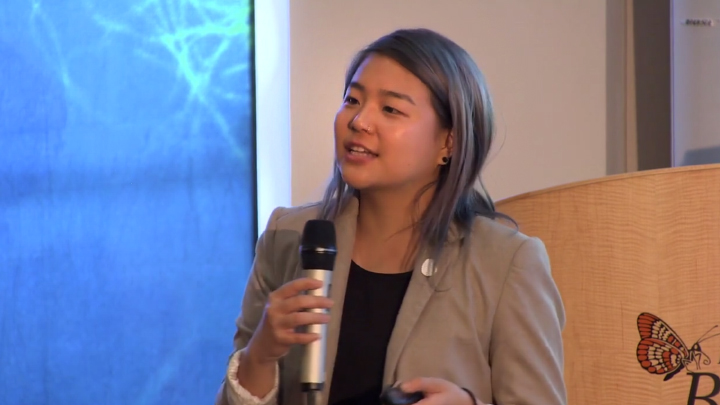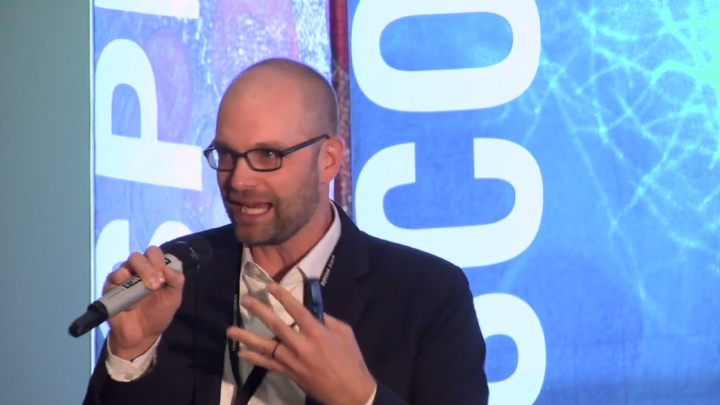Promoting Scientific Literacy
Script
Thanks again for having me out here. I feel very privileged to be part of this stellar group. This morning was amazing. It's a really tough act to follow. I'm going to start by breaking a cardinal rule in science communication, is give you a nasty Venn diagram... No, I'm just kidding. I'm not going to go over this Venn diagram, but I just wanted to introduce myself as somebody that runs a science literacy lab, which means my academics is sort of based solely into an area known as public understanding of science, or as we like to call it, PUS. It's hands-down the worst academic acronym ever. You know, like I go to PUS conferences. I'm an expert in the field of PUS. Yes, it's all bad.
But rather than kind of go over the various activities of my lab, I thought I would tell you a story, just to, in many ways, kind of talk about what many feel public understanding of science is really all about, okay? This story actually involves this meeting I had, oh this could be about 10 years ago. I was at an elementary school, visiting and talking about being a scientist, as I often do, and this was with sort of a large group of grade five, six, and sevens, and I remember very clearly after this talk, this young girl kind of came up to me. She was maybe 10, 11, and she sort of asked me a strange question. This question was the following. She asked me, "Are unicorns real?" Right?
So just so you know, it's not that strange a question, because I had just given a talk about evidence, and you know, the scientific method, and all of these sorts of things, so I kind of had a canned response ready to go. My canned response is sort of something to the effect of, "No, I don't believe unicorns are real, because currently, there exists no strong evidence to support that," right? Which I kind of like as an answer, because one, it's actually a pretty good answer in my point of view, and two, it's also kind of dull enough that it would kind of stop the questioning at that point in time.
But this girl was actually undeterred, and she actually followed up with a second question, and the second question was as follows. She next asked me, "Okay, well could unicorns be real?" Right? And I remember, my first thought was, "Smart-ass," right? Because that's a good question. That's a really nuanced question, and I kind of remember being on the spot, and I'm just sort of thinking, and I'm trying to ... bringing my repository of unicorn knowledge as much as possible, and I thought I came up with a pretty good answer.
My answer was as follows. Could unicorns be real? Well, the answer is it depends. It depends on the unicorn, right? If it's a unicorn that's just basically a horse with a horn sticking out of it, yeah, I can live with that kind of unicorn, and I think science could live with that kind of unicorn. As a geneticist, I could very easily rationalize that kind of unicorn. But if you're talking about a unicorn that makes glitter at will, and can jump over rainbows in a single bound, and that sort of thing, I would have a problem, and I think all of science would have a problem with that kind of unicorn. And I kind of even remember bringing up the first law of thermodynamics, just to kind of unequivocally state that this is why this unicorn couldn't happen, right?
So here was an answer that again, I was kind of happy with, because it's actually not a bad answer, and as well, I had just uttered the word thermodynamics, which is almost always a great conversation killer in any sense of the word, but this girl was unfazed, right? So she actually followed up with a third question, and this third question was as follows. She asked me, "Well, what if you saw a unicorn? What if you saw this unicorn leap over a ..." Basically, what if this unicorn was real, right? And I kind of remember standing there, sort of stuck, right? Like she had won, basically, and I kind of made up some sorry excuse that I had to go. I had to talk to the teacher. I kind of sort of just left the scene, right? And it's always really bothered me, right? I mean, it's bothered me for a number of reasons, probably tantamount is which that I wish I asked her name, right? Because 10 years later, I bet she's doing some pretty good stuff right now, and I might be somebody that would really love to hire her.
So anyway, what does this story have to do with PUS, or public understanding of science? And the reason why I like talking about this story is that those three questions kind of nicely encapsulate what it means to be scientifically literate, right? If you remember, in my first question, I answered by referring to strong evidence, right? This is a very pivotal part of scientific literacy, that is the idea that the scientific method is this elegant, beautiful, sometimes flawed, but otherwise amazing way to assess information to try and figure out what is real and what is not real, what is credible and what is not credible, right? And I've got a very linear, simplistic form here, where you see something, your observations, you think of a reason why, hypothesis, figure out a way to check your reason, the experiments, and which should be in large font, this is the actual experimentation, the data that you receive. Everyone gets to dump on you, expert peer review, and so on and so on and so on.
This is really key as far as what it means to be scientifically literate, right? A lot of educators would feel maybe this is sort of the priority that we should take, right? And I think everyone can agree that in these sorts of times, this sort of being scientifically literate is particularly important, given the case of how the information ecosystem is currently working, right? What's the most common way of getting your information? The anecdote, right? Which is like worst data set ever, right? You also have things like confirmation bias, which is to say that it's great that I'm telling you this sort of stuff, but really, that's not really the kind of folks that I want to get this sort of information out. You tend to interact with the folks that will believe, and trust, and agree with you anyway, and that's a problem there, right?
And then of course, there's sort of credibility issues, where sometimes the person with the largest microphone isn't actually the most credible person, doesn't actually know what they're talking about, could indeed be making stuff up, as you are fully aware of in this ... As a Canadian, I've been noting this quite often, so ... So this is key, right? This is key, and I know my lab, often we have this central idea that maybe a lot of our programs isn't so much about training scientists, training people to become scientists, but maybe just training people so that they see merit in thinking like a scientist, right? Actually having that critical skepticism, but evidence-based line of thinking. So that's the first unicorn question that kind of came up.
The second one, of course, I mentioned thermodynamics, right? I mentioned the first law of ... I'm actually interested here, how many people know what the first law of thermodynamics is? Hands up. Okay. Yes. Okay. Well, I can be sort of cheeky and say, "Well, this is the first law of thermodynamics," and this is actually a mathematical expression of the first law of thermodynamics. You do actually know it. It's often pitched as the law of the conservation of energy, right? It's kind of the dictum that says energy cannot be created out of nothing and can't just disappear willy nilly ... It's how the universe bookkeeps energy, keeps everything in track.
And this second question, where I referred to, "Yeah, it depends on the type of unicorn," is really relating to a second facet of scientific literacy, which is that sometimes scientific literacy is viewed as the sorts of facts and technical information that you know, right? So I would argue that it's not a bad idea to understand the first law of thermodynamics if you want to talk about climate change. This is the core of how modeling is done, right? It's how they bookkeep energy. If more heat's coming in, that's going to have consequences, in the form of work, things moving, like waves, air, wind, right? That's going to have consequences in internal energy, things changing in their sort of energy states, like water going from liquid, to solid, to gas, or what have you.
But the point here is that this second element of scientific literacy is also very important, but it's important with context, and what I'm trying to say here, and I think a lot of people in my field agree with this, is that what you know in terms of technical facts will depend on your background, and will depend on what's important to you, right? The sorts of technical facts that you need to know as a parent, versus a doctor, versus a farmer, versus a gene jockey at NEB are going to be very different, right? So this is another element that kind of comes up, okay?
Now, the third question, the third and final question, if you recall, I didn't have an answer, right? And I mentioned that it's always bothered me. Like, it has really bothered me. I've stayed up nights sometimes, thinking about this. "What should I have said," right? And you know, 10 years later, I think I actually have a pretty good answer for what I should have said, so if she had asked me again, "What if you saw this unicorn? What if you actually saw it, and it was real, right? What if this unicorn was real?" I think the most appropriate response would be, "You saw a real unicorn? Holy crap," right? Right? Right? If you saw a real unicorn, you'd be freaking out, quite frankly, right?
And this sort of relates to a third element of scientific literacy, which more and more these days, I think is becoming the most important part of scientific literacy, and that is to realize that science ... It's not just critical thinking, it's not just technical facts, but it's to realize that science is a culture into itself, and it permeates in all of these other fields and all of these other areas, right? For instance, I mean, if a unicorn was real, could you imagine the drama unfolding, right? The historical significance of that, the creativity it would require for those scientists to actually make sense of that data in lieu of current universal laws of the universe or what have you? Can you think of how people will be trying to monetize that information? Will you think of how that might have a role in sort of socio-type elements.
You really have to consider that science is permeating culture in so many different ways, and I feel this is all the more important these days, as identity is such a big part of how people react to everyday life, to information, to how they take in facts, or non-facts, or what have you, that really getting a sense of how science is kind of part of this bigger picture is really key, right? So that's the third element.
And I just want to say that my lab, I'm lucky enough in that I have a great team of academics, and grad students, and undergrads, and the odd postdoc as well, where we get to dabble in all three different areas of this scientific literacy sort of genre, if you would like. We're very active in sort of looking at things around evidence-based thinking. We do have a fully equipped molecular genetics lab. We recently acquired a next-gen sequencer, where we're actually able to take some pretty high advanced technical content and bring that to the public as well.
And then lately, we've been very engaged in sort of looking at science as a culture, right? We have projects right now where we're working with creative writing, and we're actually doing a large-scale study, trying to figure out how do kids actually view what being sciency means, and how do they view what being creative means? And our children, right, when you actually give them these terms, and you ask them to formulate what they think a creative person is and what they think a scientific person, is there room where the two actually come together, right? And if there isn't, then what sort of consequences can that relate to down the road, right? So we have projects like that.
I know in the write-up, there was a brief mention of our card game stuff. I brought card games, so if we want to play later, just let me know, and I actually have a deck right here, that ... I actually brought some other decks as well, but this is actually a lovely example of sort of an interdisciplinary project between artists, and gamers, and science folks, and museum folks, and educators, and even intellectual property lawyers. There's a story in that itself.
So I just want to finish that because my lab is lucky enough to be engaged in all sorts of different types of projects, a question I often get asked is, "Have you figured out a best way to communicate science?" The short answer is no, and the longer answer is what I tend to find is the most important thing, as far as being an advocate, or communicating science, or even sort of trying to figure out your style and the educational context, is to simply be authentic, right? It's funny that it's nice that NEB has this "be genuine" guideline, because in many ways, that is absolutely key, I believe, for science communication and science ed techniques, because what that means is that the more people are being authentic, that means you can be awkward. That's fine, right? That means you can be feisty. That's fine. That means you can be technical, visual, creative, whatever happens to be your authentic way of delivering what it is you love.
But the idea is that the more that people do this, the bigger the chance that the general public at large will see that we as science folks are as diverse as they are, so because if we're sort of emulating that diversity as well, we have that opportunity to bring other people in, right? It's sort of the idea that, "Oh, that person is awkward. I'm awkward. I'm going to go with them. This person really loves art. I love art as well. I've got a way into that identity and that culture," and I think that is absolutely key these days. Okay? All right, thank you.
Related Videos
-

BIOTA: Symbiosis in Action -

Communicating Science with Zines -

Inspiring Exploration in Botany

